Answer these simple questions and we will find you the BEST prices
Which type of solar quotes do you need?
It only takes 30 seconds
100% free with no obligation

Get Free quotes from insulation specialists near you

Save money by comparing quotes and choosing the most competitive offer

The service is 100% free and with no obligation
- GreenMatch
- Insulation
- Basement Insulation
Basement Insulation: Benefits, Types and Regulations

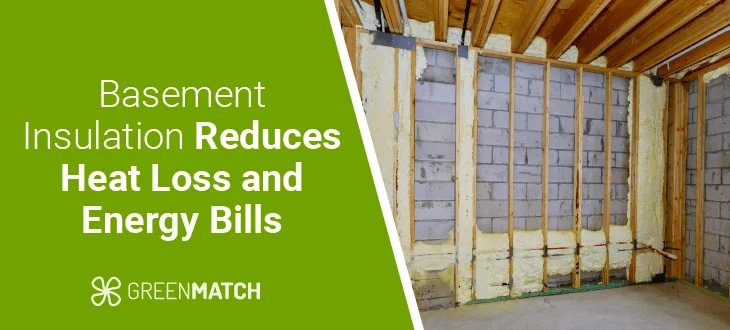
- Heat loss through the basement contributes 15% to 30% of yearly energy loss.
- Home insulation, including basement insulation, can help reduce heat loss and lower your energy bills.
- Basement insulation turns basements into usable spaces by keeping them dry and preventing moisture and mold.
- Choosing the right insulation for basement walls depends on various factors, including budget, sustainability, and specific needs like moisture control or soundproofing.
Basement insulation is a straightforward and effective way to improve energy efficiency, comfort, and safety in UK homes. Homeowners can use suitable materials such as mineral wool, fibreglass, or rigid foam boards to enhance thermal performance and soundproofing, making the basement more comfortable and functional.
In this guide, we will discuss what to consider when insulating your basement, from insulation materials to regulations and the benefits of insulation.
Ready to get started on your insulation? Instead of spending endless hours searching online, let us handle the effort for you. Simply click the button below, and we’ll connect you with up to 4 free quotes from professional installers in your area. It takes 30 seconds to complete our online. Click below to get started now!
Fill in the form in just 1 minute
Benefits of basement insulation
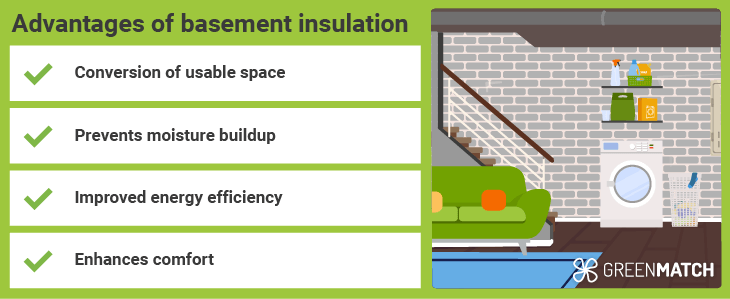
Basement insulation, often called basement wall insulation or cellar insulation, is a crucial aspect of home improvement that offers several benefits, especially for UK homeowners. Properly insulating and finishing a basement can transform it from an often underused space into a valuable extension of your home. Let's explore the various benefits of insulation for basement walls and why it's a wise investment.
Conversion of usable space
A properly insulated and finished basement allows the space to be converted into a functional area. Insulating the basement walls creates a comfortable and livable environment, ideal for various uses.
You can transform your basement into a home office, gym, guest room, or even a play area for children. This conversion enhances your living space and increases your home's overall value. Moreover, a well-insulated basement can serve as a great storage area, keeping your belongings safe from the elements.
Prevents moisture buildup
Insulating basement walls is one primary way to control moisture and prevent dampness. Basements are naturally prone to moisture buildup, leading to mould growth and structural damage over time.
Insulating the basement with the right materials helps create a barrier that keeps moisture out, ensuring the space remains dry. This is particularly important in the UK, where damp weather is common. By preventing moisture buildup, basement insulation helps to protect your home from mould, mildew and associated health risks.
Improves energy efficiency
Basement insulation plays a significant role in improving a home's overall energy efficiency. Uninsulated basements can be a major source of heat loss, causing your heating system to work harder and increasing energy bills.
Insulating your basement walls can reduce heat loss and maintain a stable indoor temperature throughout the year. This leads to lower energy consumption and reduced utility costs. Additionally, an insulated basement helps retain cool air during the summer months, providing a more comfortable living environment.
Enhanced comfort
Insulating your basement contributes to a more comfortable home environment. Proper insulation for basement walls helps regulate temperature, reduces drafts, and minimises noise from outside. This enhanced comfort makes the basement more inviting for family activities or a personal retreat.
Furthermore, by maintaining a consistent temperature, basement insulation can prevent cold floors on the upper levels of your home, contributing to overall thermal comfort.
Meeting building regulations and standards
In the UK, there are specific building regulations regarding the insulation of basements, especially for new builds or when converting a basement into a habitable room.
Proper basement wall insulation ensures compliance with these regulations, avoiding potential legal issues and penalties. Meeting these standards also assures that the insulation effectively provides the desired benefits, such as energy efficiency and moisture control.
Types of basement insulation
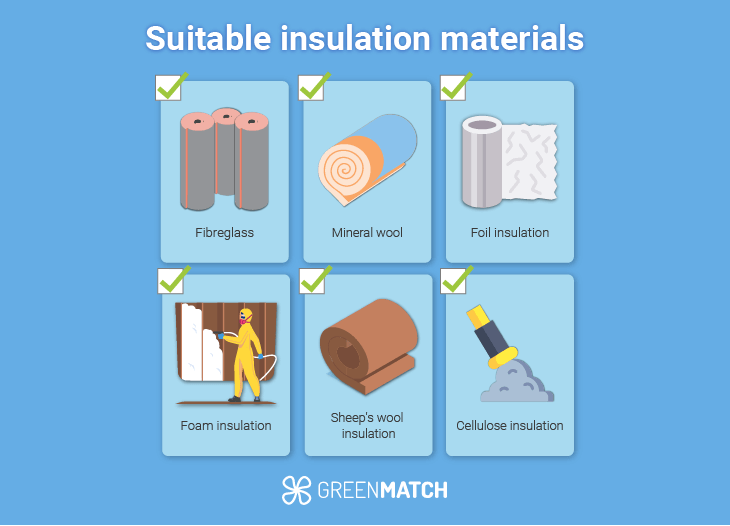
When choosing the right basement insulation for your UK home, consider the types of materials available, their sustainability, and their costs. Here, we will discuss the most suitable materials for insulating basement walls and their pros and cons.
Fibreglass
Fibreglass is one of the most popular materials for basement wall insulation due to its affordability and ease of installation. It comes in batts or rolls that fit snugly between wall studs. Fibreglass effectively reduces heat loss and noise, making it a good thermal and acoustic insulation choice.
- Sustainability: Fibreglass is considered relatively sustainable because it is made from recycled glass and sand. However, the production process requires a significant amount of energy.
- Cost: Fibreglass insulation is among the most cost-effective options, typically costing between £10 per square metre.
Mineral wool
Mineral wool, also known as rock wool or stone wool, is another excellent option for insulating basement walls. It provides superior thermal and acoustic insulation and is highly resistant to fire and moisture, making it ideal for basements prone to dampness.
- Sustainability: Mineral wool is more sustainable than fibreglass. It is often made from natural and recycled materials like basalt rock or industrial slag and has a lower environmental impact during production.
- Cost: Mineral wool insulation costs more than fibreglass, ranging from £13 - £17.5 per square metre.
Foil insulation
Foil insulation is a reflective material often used in combination with other types of insulation. It works by reflecting radiant heat, which can be particularly effective in basements to help maintain a stable temperature. Foil insulation is usually installed on the exterior side of the insulation boards.
- Sustainability: Foil insulation has a moderate environmental impact. It is typically made from aluminium, which is recyclable but requires substantial energy.
- Cost: The price of foil insulation can vary depending on its thickness and quality, but it usually costs £3 to £5 per square metre.
Foam insulation
Foam insulation, available in rigid foam boards or spray foam, provides excellent thermal insulation and air sealing, making it ideal for basement wall insulation where moisture control is crucial. Rigid foam boards are commonly used for insulating basement walls, while spray foam can fill gaps and cracks, providing an airtight seal.
- Sustainability: Foam insulation is generally less sustainable due to its petrochemical production and environmental impact. However, some newer products use more eco-friendly blowing agents and recycled materials.
- Cost: Foam insulation is more expensive, with rigid foam boards costing between £5 to £15 per square metre and spray foam costing even more at £21.5, depending on the application thickness.
Sheep's wool insulation
Sheep's wool insulation is a natural, sustainable option for cellar insulation. It provides good thermal and acoustic insulation and is naturally fire-resistant. Sheep's wool can also help regulate humidity levels, making it suitable for basements in damp climates.
- Sustainability: Sheep's wool is highly sustainable, a renewable resource, biodegradable, and has a lower carbon footprint than synthetic materials.
- Cost: Wool insulation is more expensive due to its natural origin, costing around £17.5 to £22 per square metre.
Cellulose insulation
Cellulose insulation is made from recycled paper products treated with fire retardants. It is an eco-friendly option that provides good thermal and sound insulation. If applied correctly, cellulose is often used in attics but can also be suitable for basement wall insulation.
- Sustainability: Cellulose is highly sustainable, made from recycled materials, and has a low environmental impact.
- Cost: The cost of cellulose insulation varies, generally ranging from £10 to £12 per square metre.
What is the best basement insulation?
The best insulation choice for basements in the UK depends on the specific type of basement walls and their unique conditions. For walls in contact with soil, stone wool insulation - also known as mineral wool insulation - is highly recommended. This type of insulation is excellent for preventing heat loss and minimising moisture buildup, which is crucial for maintaining a dry and comfortable basement environment.
Stone wool offers superior thermal and acoustic insulation properties. It is also naturally resistant to fire and moisture, making it an ideal choice for basement wall insulation where dampness is a concern.
Dry lining products can be highly effective for concrete-facing cellar walls. These products help create a barrier that reduces moisture penetration, thus preventing dampness and maintaining a stable indoor environment. They are often used to provide a smooth finish over the insulation and can help improve the overall energy efficiency of the basement.
Where to insulate in a basement?
Basement walls, floors, ceilings, rim joists, around pipes and ductwork are all important areas to insulate to ensure a comfortable, energy-efficient home. By selecting the right insulation materials and targeting these critical areas, homeowners can create a basement space that is dry, warm, and energy-efficient.
Basement wall insulation
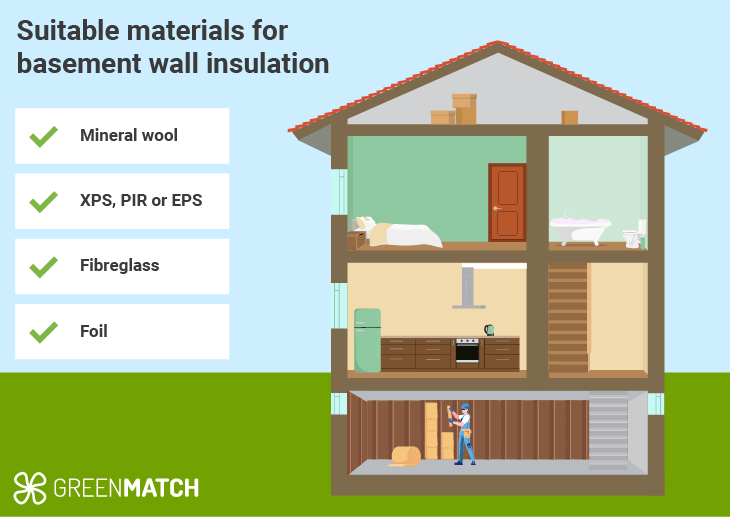
Insulation for walls is crucial for maintaining a comfortable, energy-efficient home in the UK. It prevents heat loss, controls moisture, and enhances overall comfort. Insulating basement walls involves adding a layer of insulation to the interior or exterior of the walls to create a thermal barrier.
External wall insulation
Also known as outside wall insulation, this method involves adding insulation to the exterior of the basement walls. This is particularly effective for reducing thermal bridging (where heat escapes through the wall structure) and provides a continuous insulation layer. External wall insulation is typically covered with a weather-resistant finish, such as render or cladding, to protect it from the elements.
Internal wall insulation
Also referred to as inside wall insulation, this method involves installing insulation on the interior side of the basement walls. This can be done using rigid foam boards, mineral wool, or fibreglass batts. Internal wall insulation is often more accessible and less expensive to install than external insulation but may reduce the usable space in the basement slightly. This method is ideal for retrofitting basements where external insulation is not feasible.
Suitable materials for basement wall insulation
- Mineral wool (stone wool): Excellent for moisture control and thermal insulation.
- Rigid foam boards (XPS, PIR, EPS): High thermal resistance and moisture control, suitable for internal and external insulation.
- Fibreglass: Cost-effective with good thermal properties but requires a moisture barrier.
- Foil insulation: Reflects radiant heat and is used alongside other insulation types.
Basement ceiling insulation
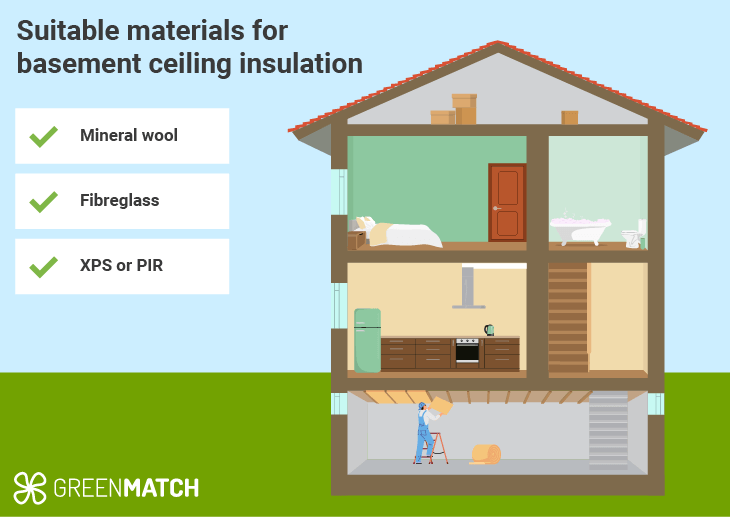
Basement ceiling insulation is crucial for enhancing energy efficiency and comfort in UK homes. Typically installed between ceiling joists, it helps reduce heat loss and minimise noise transfer between floors.
How does basement ceiling insulation work?
Insulating the ceiling involves placing materials between the joists to create a thermal barrier. This prevents heat from escaping the rooms above and keeps the basement warmer. It also reduces noise transmission between floors, particularly useful if the basement is used as a living space or office.
Suitable materials for basement ceiling insulation
- Mineral wool (stone wool): Excellent for thermal and sound insulation, it’s fire-resistant and moisture-resistant, making it ideal for damp UK basements.
- Fibreglass: A cost-effective option that provides good thermal insulation and soundproofing and is easy to install between ceiling joists.
- Rigid foam boards (XPS, PIR): These offer high thermal resistance and moisture control, making them suitable for damp environments.
Basement floor insulation
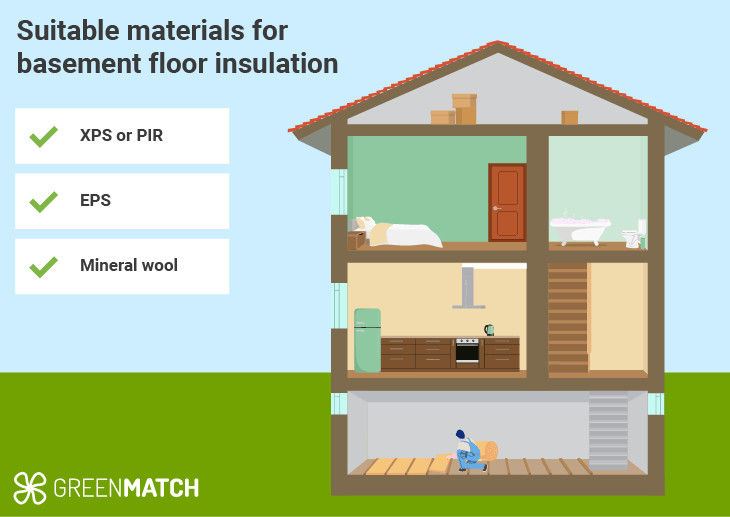
Floor insulation is essential for improving energy efficiency and comfort, particularly in the UK, where basements can be cold and damp. It helps prevent heat loss through the ground and keeps the space warmer.
How does basement floor insulation work?
Insulating a basement floor involves adding insulation beneath the floor or as part of a raised flooring system. This creates a thermal barrier that reduces heat loss to the ground and prevents cold from entering the living space. It also helps manage moisture, protecting against dampness and cold floors.
There are two main methods for installing basement floor insulation:
- Underneath the basement floor: Insulating material is laid directly underneath the concrete slab or the floor surface. This method is typically used in new builds or major renovations where the floor can be lifted or replaced.
- Raised flooring system: Insulation is added to a raised floor system, where insulating boards or panels are placed above the existing floor. This method suits retrofit situations and provides additional insulation without extensive construction work.
Suitable materials for basement floor insulation
- Rigid foam boards (XPS, PIR): These are ideal for both methods because they are highly thermally resistant and moisture-controlled.
- Expanded polystyrene (EPS): Cost-effective and moisture-resistant, suitable for basement floors.
- Mineral wool: It provides additional soundproofing and insulation and is mainly used in raised flooring systems.
Basement insulation requirements in the UK
Some specific rules and regulations govern how basements should be insulated to meet UK building standards. Here’s a summary of the UK's key rules and regulations for basement insulation.
Building regulations compliance
All basement insulation work in the UK must adhere to Building Regulations, particularly Part L, which deals with the conservation of fuel and power. This regulation sets minimum standards for thermal insulation, requiring basements to achieve specific U-values (a measure of thermal performance).
For basement wall insulation and floors, the target U-value is typically 0.25 W/m²K or lower, ensuring good thermal efficiency and reduced heat loss.
Moisture protection
UK regulations also require that basements be safeguarded against moisture ingress. This involves using damp-proof membranes and moisture-resistant materials like stone wool or rigid foam boards to prevent dampness, mould, and mildew, which can compromise the integrity of insulation for basement walls and impact indoor air quality.
Fire safety standards
Basement insulation materials must comply with fire safety standards. Fire-resistant materials like mineral wool or rigid foam boards (like PIR) are often preferred. These materials help prevent fire spread, particularly in basements with limited escape routes.
Ventilation requirements
Adequate ventilation is crucial in insulated basements to prevent condensation and maintain healthy indoor air quality. Building regulations may require the installation of proper ventilation systems, especially when using airtight insulation solutions like spray foam, to ensure effective air circulation.
Radon protection
In some parts of the UK, where there is a higher risk of radon gas accumulation, additional measures are necessary when insulating basements. This might include installing radon barriers or ventilation systems to prevent radon buildup and ensure safe indoor air quality.
Should you insulate your basement?
You should consider basement insulation for your home, especially if you live in the UK, where basements can be prone to dampness and cold. Insulating your basement offers numerous benefits, such as improving energy efficiency, increasing comfort, and preventing moisture problems like mould and mildew. Proper basement insulation can also enhance the overall value of your home by making it more comfortable and reducing heating costs.
Ready to boost your basement's comfort and efficiency with the right insulation? Skip the hassle of searching for installers - click the button below, and we’ll connect you with up to 3 free, personalised quotes from trusted local professionals!
Fill in the form in just 1 minute
FAQ
Mineral wool (stone wool), rigid foam boards (such as XPS or PIR), and fibreglass are good options for basements. These materials provide excellent thermal resistance, moisture control, and mineral wool fire resistance.
In the UK, basement insulation must comply with Building Regulations, specifically Part L, which requires achieving a U-value of 0.25 W/m²K or lower for walls and floors. Additionally, basements must be protected against moisture ingress and comply with fire safety standards.
Yes, you can insulate an existing basement. You can do this by adding internal wall insulation, such as rigid foam boards or mineral wool batts, or by installing a raised floor system with insulation underneath.
Fibreglass batts or expanded polystyrene (EPS) foam boards are the cheapest way to insulate basement walls. These materials are cost-effective, easy to install, and provide good thermal insulation.

Nicole Bea Kerr is a content writer for Greenmatch, leveraging her experience in B2B journalism and editing. She is interested in bringing more awareness to sustainability through informative narratives.
We strive to connect our customers with the right product and supplier. Would you like to be part of GreenMatch?

